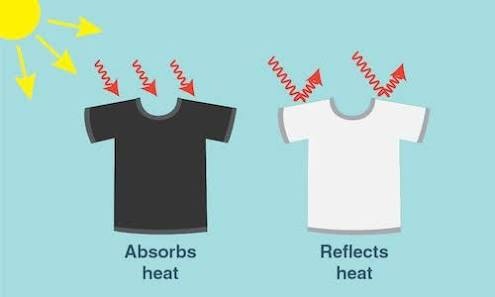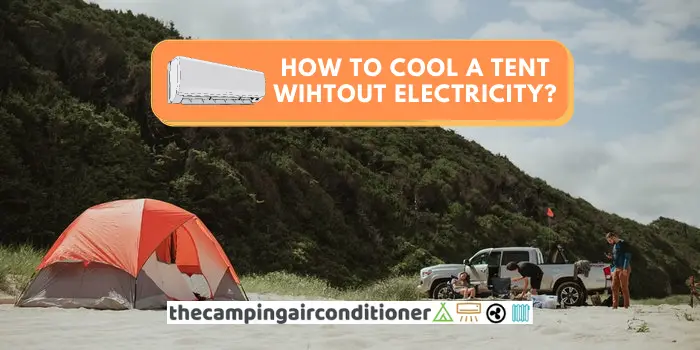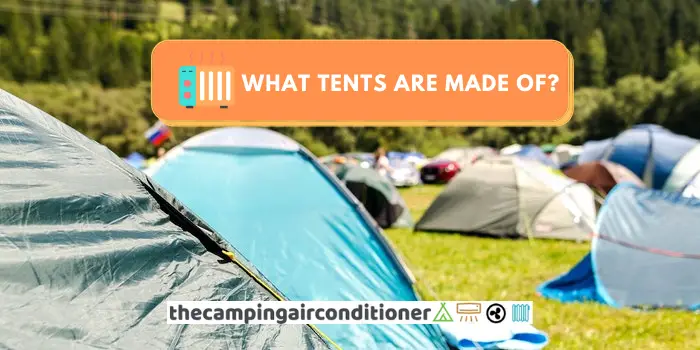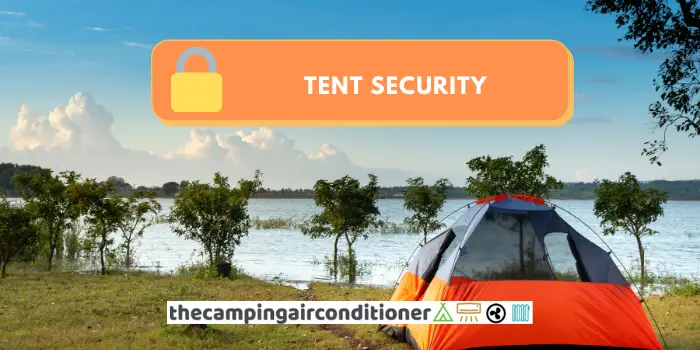With technology evolving and multiple tent options these days, one of the basic aspects we should consider when buying a tent is its color. So, should you really worry about tent color? Absolutely!
Apart from the aesthetics features, multiple aspects should be taken into consideration when choosing their color, such as:
- The chosen tone might influence the temperature inside your tent, so be careful when selecting it. Overall, darker colors retain heat, whereas brighter ones are more heat reflective.
- Sleeping quality – It is also known that colorimetry might impact your sleeping patterns. Overall, red lights appear to offer better sleeping conditions.
- Safety reasons – In case of an emergency, a brighter tent will help tent spot and identification. This is especially important in case you are camping in a remote location and by yourself – we never know when something bad can happen. On the other hand, if you, for whatever reason, want to hide from others, you can find camouflage alternatives.
- Mosquito repellent – According to mosquitojoe.com, lighter colors, like white, beige, and khaki (and its variants) are an excellent repellent alternatives. Mosquitos enjoy darker environments and avoid light exposure.
Hence, How to choose the best tent color for you?
The answer is not that simple and should consider many factors and your personal preferences – let’s go through each point in detail.
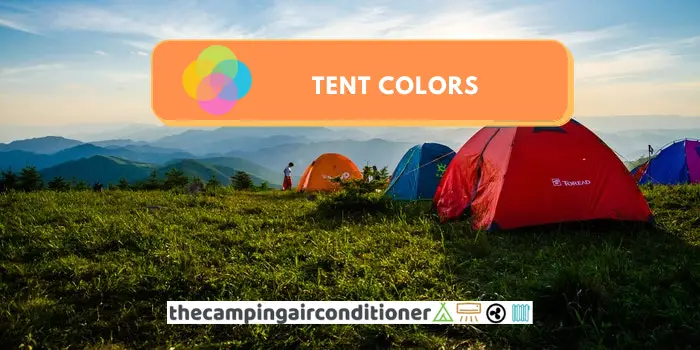
Tent Color - Heat Absorption
The part of science that studies the measurement of colors is name colorimetry. From physics foundations, we know that light energy can be converted into heat, which explains why some objects get warmer than others when exposed to sunlight.
Overall, darker colors retain more heat from the environment since it absorbs a wide variety of light wavelengths. Black is the color that absorbs all wavelengths and, therefore, is the “hottest” color.
On the other hand, brighter colors (yellow, beige, light green, white) have high reflection rates, making them most suitable for summer camping.
Therefore, the most important question you should consider before choosing your preferred tent tone for heat absorption is the average weather conditions.
For example, suppose you are camping during summer. In that case, you might prefer a tent with lighter colors, as they will provide you with less heat retention and a less stuffy environment inside your shelter (if you camping in hot weather, it might be worth considering a tent fabric with good breathability, such as canvas.)
Conversely, suppose you are camping on cold winter days. In that case, you might be prone to pick a darker color, since it will retain the heat provided by the sunlight during the day. However, if the forecast indicates freezing weather, you should bring a tent heater.
Tent Color - Sleeping patterns
Chromotherapy is a therapy segment that uses different light colors to treat both physical and emotional issues/diseases. According to the National Library of Medicine, this type of treatment has been used since 2000 BC by Egyptians.
Regarding sleeping patterns, it has been discovered that some colors might increase the production of melatonin, a hormone produced by the penal gland that has a direct influence on sleeping quality. Melatonin helps to regulate our circadian rhythm and improve body cycles.
A Recent study has shown positive results (improved sleep and muscular recovery) for a small group of 20 female basket players that received red light exposure after being exposed to 30 min to it during the night.
On the other hand, multiple articles indicate that the blue color can hinder melatonin production and, therefore, impact your resting hours.
Tent Color - Safety Reasons
Sometimes unexpected things happen. You might fall during your camping days, have an injury, or even get lost during your camping trip. Especially if you are camping by yourself in isolated or remote areas, we recommend using flashy and bright colors that will help people to quickly spot and identify you in case of an emergency.
On the other hand, some hunters, stealth campers, and survivalists tend to prefer camouflaged options. Camo tents, such as miltec room (shown below), help you to mesh with nature and keep a low profile.
The choice between flashy pallets and camouflage alternatives is very personal. We prefer brighter colors, since we are always worried about some unexpected emergency.
Tent Color - Mosquito repellent
We all know how mosquitos can be annoying during our outdoor days. Picking the right tent tone might help avoiding them.
Overall, these insects are attracted to darker colors. This happens because of their eyesight system, which has specific mechanisms to detect adjustments in light levels.
Even though there is no scientific evidence behind the relationship between colors and mosquito repellence, common knowledge indicates that brighter colors (white, yellow, khaki, light green) might help you on escaping from them.
This does not necessarily mean that lighter tones are natural repellents. However, between a dark and light color surface, it is very likely that mosquitos will choose the former one.
Therefore, if you want to run away from these insects, consider shiny variations of yellow, white and green!
It is also worth considering a mosquito repellent. We always carry a plant-based eco-friendly option with us, as it is very helpful with these insects and it does not carry chemicals in its composition.
FAQ
Is there a specific color that attract bears?
No. There is no scientific foundation to prove that some specific colors attracts bears.
Usually, these animals are driven by food and smells. In fact, bears are extremely odor sensitive can be attracted not only by good scents, but also by garbage and food that has gone bad.
Is there a specific color that attract bugs and birds?
Overall, both bugs and birds are likely to be attracted to brighter tones.
What is the best color for a tent?
There is no perfect or best color.
Each option will come with advantages and drawbacks. The most suitable color for you will depend on your personal preferences and camping site conditions, such as:
a) Temperature / Heat absorption
b) Aesthetics
c) Safety
However, it is widely known that brighter options might alleviate temperature, since they do not retain heat. Conversely, darker options might be a good option for winter camping.
What is the best tent color for beach camping?
Prolonged exposure to UV rays in among the biggest risks of beach camping.
According to the skin cancer foundation, dark and bright colors (i.e. red, black, navy blue) will retain more UV rays than lighter tones, and therefore should avoid wearing them.
If you are going beach camping, bring an UV protected tent and always wear sunscreen – read this article with some tips for UV protection for tents.
What is the best color for forest camping?
For safety reasons, we recommend using brighter and shiny colors, such as yellow. They will help on identification in case of an emergency or if you are lost.
Are there blackout tents?
Yes – blackout tents are tents that block almost all natural light and provide you with almost complete darkness inside it. Coleman dark room skydome tent is a great blackout tent option.
Conclusion
As detailed above, colors for tents are more than a simple aesthetic element. They can directly influence your comfort when resting under a tent.
If you are worried about temperature, stick to lighter tones, which are best to avoid heat retention. Brighter options might also help escape from mosquitos, and flashy variations will facilitate your spot and identification in case of an emergency.
Red tents might help you sleep better, given that recent studies have shown that exposure to this tone during the night might increase melatonin levels.
If you are a hunter or simply like to keep a low profile, a camo tent might be the best option for you. They help you mesh with the natural landscape and enjoy your nature days without being noted.

